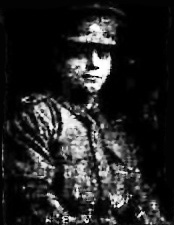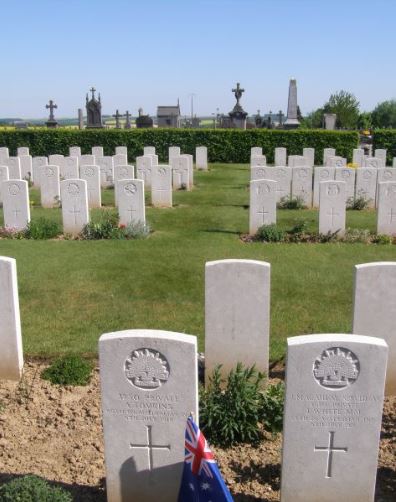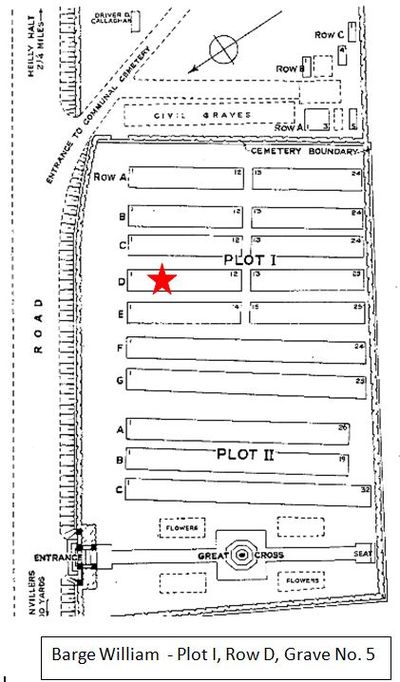Difference between revisions of "William Barge"
From Our Contribution
(→External Links) |
|||
| Line 51: | Line 51: | ||
==War Service== | ==War Service== | ||
| − | The [[28th Battalion]] embarked for Egypt on 9 Jun 1916 and on their arrival spent some time training near Cairo while waiting for the rest of the 7th Brigade to arrive. While William's early records are missing, it is probable that he joined the 28th Battalion on its first day in Australia, i.e. 16 Apr 1915. William embarked for Gallipoli with the battalion from Alexandria on [[HMT Ivernia]] on 4 Sep 1915, and on 10 Sep 1915 he transferred to the [[ | + | The [[28th Battalion]] embarked for Egypt on 9 Jun 1916 and on their arrival spent some time training near Cairo while waiting for the rest of the 7th Brigade to arrive. While William's early records are missing, it is probable that he joined the 28th Battalion on its first day in Australia, i.e. 16 Apr 1915. William embarked for Gallipoli with the battalion from Alexandria on [[HMT Ivernia]] on 4 Sep 1915, and on 10 Sep 1915 he transferred to the [[HMS Sarnia]] for the journey from Mudros harbour to Anzac Cove. The 28th Battalion saw only limited action while at Gallipoli. The 28th Battalion less a selected group of machine gunners were evacuated to Mudross Harbour aboard [[HMT Osmanieh]] on 12 Dec 1915, and remained on Lemnos Island until they returned to Alexandria from Mudros aboard [[HMT Ausonia]] on 10 Jan 1916. |
Revision as of 18:34, 12 October 2023
 | |
| Personal Information | |
|---|---|
| Date of Birth | c1895 |
| Place of Birth | Manchester, England |
| Death | 1 June 1918 |
| Place of Death | near Albert, France |
| Age at Enlistment | 21 |
| Description |
5' 5½" (1.66m) tall ; 156 lbs 70.76 kg ; dark complexion ; grey eyes ; black hair |
| Occupation | Farm labourer |
| Religion | Church of England |
| Address | c/- Millrace Farm, Beenup SWR, Western Australia |
| Next of Kin | Father , Mr William Barge (in UK) |
| Military Information | |
| Reg Number | 228 |
| Date of Enlistment | 8 March 1915 |
| Rank | Corporal |
| Unit/Formation | 28th Battalion, B Company / 7th Brigade, 2nd Division |
| Date of Embarkation | 9 June 1915 ‒ 30 June 1915 |
| Ship Embarked On | HMAT A11 Ascanius |
| Fate |
Wounded in Action 31 May 1916, France Killed in Action 1 Jun 1918 near Albert, France. |
| Monument |
Armadale War Memorial (Beenup panel) Armadale and Districts Roll of Honour ANZAC Memorial Park (Byford) Australian War Memorial |
| Medals |
1914-15 Star British War Medal Victory Medal |
Pre War
William as a 16 year old embarked in London on 18 Nov 1911 aboard the SS Armadale as an assisted migrant, arriving in Fremantle on 1 Jan 1912. Given his age would not have been put down for this, his date of birth is more likely 1895, and hence at enlistment he was more likely 20 years old.
War Service
The 28th Battalion embarked for Egypt on 9 Jun 1916 and on their arrival spent some time training near Cairo while waiting for the rest of the 7th Brigade to arrive. While William's early records are missing, it is probable that he joined the 28th Battalion on its first day in Australia, i.e. 16 Apr 1915. William embarked for Gallipoli with the battalion from Alexandria on HMT Ivernia on 4 Sep 1915, and on 10 Sep 1915 he transferred to the HMS Sarnia for the journey from Mudros harbour to Anzac Cove. The 28th Battalion saw only limited action while at Gallipoli. The 28th Battalion less a selected group of machine gunners were evacuated to Mudross Harbour aboard HMT Osmanieh on 12 Dec 1915, and remained on Lemnos Island until they returned to Alexandria from Mudros aboard HMT Ausonia on 10 Jan 1916.
In Tel-el-Kebir, Egypt on 21 Jan 1916, William was charged with being AWOL from tattoo on 19 Jan 1916 until tattoo on 20 Jan 1916. Admonished by his Commanding Officer he would have also forfeited 2 day's pay. After a period training and re-organising while in the canal defence area, the battalion on 15 Mar 1916 boarded a train at Moascar for Alexandria, arriving early the next morning. After a delay they boarded the HMAT A32 Themistocles for Marseilles in southern France which they reached on 21 March 1916 before disembarking the following day to board a train for northern France. Forty men and their equipment were loaded into each truck intended to carry 8 horses, and after a 57 hour long journey they arrived at their destination, Morbecque where it was snowing. They had transitioned from desert heat to snow in 10 days.
On 31 May 1916 while in the front line in the Bois Grenier area east of Fleurbaix, William was wounded in the arm and leg, the first of our local boys to be a casualty on the Western Front. He was treated by the 6th Field Ambulance, and the 8th Casualty Clearing Station who then sent him to the 26th General Hospital in Étaples where he was admitted on 31 May 1916. On 9 Jun 1916 he boarded HMHS Newhaven for England, and following his arrival he was admitted to the Ontario Military Hospital the same day. On 21 Sep 1916 he was discharged to duty and soon after reclassified at the No.1 Command Depot at Perham Downs before being sent to the 7th Training Battalion at Rollestone on 21 Sep 1916.
On 26 Feb 1917 he arrived back in France, and he rejoined the battalion on 3 Mar 1917 in the front line near Warlencourt. Appointed Lance Corporal on 17 Apr 1917, and then promoted Temporary Corporal on 6 May 1917. Sent back to England, he joined the staff of the 7th Training Battalion on 8 Jul 1917 a day after his rank was confirmed. On 7 Nov 1917 he transferred to the 6th Training Battalion before proceeding overseas from Southampton via the Overseas Training Brigade on 30 Jan 1918.
William was admitted to the 39th General Hospital with Venereal Disease on 3 Feb 1918, and was released to duty on 26 Feb 1918 (24 days ineffective service) and then spent until 27 Mar 1918 at the Division's Base Depot. He rejoined the 28th Battalion on 30 Mar 1918 at Ingersol Camp near Le Rossignol. Soon after, they began the transition south to join the force blocking the Germans advance on Amiens.
On 1st Jun 1918 the 28th Battalion was being relieved from the front line, when 'B 'Company was observed by an enemy plane which dropped two bombs on them, killing 27 and wounding another 40, together with three horses. As this is the only action logged in the Battalion War Diary for that date, we might assume that William was one of the unfortunate 27 men who died.
1 Jun 1918 Buried in Plot I, Row D, grave 5 FRANVILLERS COMMUNAL CEMETERY EXTENSION. Son of William and Susan Barge, of 45, Boscombe Grove Rd, Bournemouth, England. Native of Moor Farm, Weymouth, England
"...Was wounded in France, returned to duty and then fell ill of diphtheria."[1] (Brother living in Byford and Sister in Perth)
Originally William was reported as wounded, but this was corrected in the 413th Casualty List. "WESTERN AUSTRALIA. ROLL OF HONOUR 413th CASUALTY LIST. The 413th casualty list was released by the Censor yesterday. KILLED IN ACTION. ...... Cpl Barge, William (England), previously reported wounded[2]
Post War
The West Australian Tue 1 Jun 1920 has an 'In Memoriam Notice' inserted by his brother Ebby, but this seems to have been missed by military authorities.
"The Military authorities are desirous of communicating with the next-of-kin of deceased soldiers, who were formerly resident at the addresses given hereunder: No 228 Corporal W. Barge, 28th Battalion, Mr W Barge (father), Coombe Farm, Dorset, England.[3]
Report of a marriage in Armadale of Ebby (brother of William) to May Gordin (parents Mr & Mrs A.J. Gordin; grandmother Mrs H. Mead of Beenup)[4]
No records of a marriage or children for William found.
References
- ↑ "The Drill of the Foot-Hills" (PDF) (1917). Western Australia. Mar 1917. p. 14. Retrieved 16 May 2017 – via State Library of Western Australia.
- ↑ "WESTERN AUSTRALIA.". The West Australian. XXXIV, (5,067). Western Australia. 2 July 1918. p. 5. Retrieved 18 May 2017 – via National Library of Australia.
- ↑ "NEXT-OF-KIN.". The West Australian. XXXVI, (5,710). Western Australia. 2 August 1920. p. 9. Retrieved 18 May 2017 – via National Library of Australia.
- ↑ "WEDDINGS". Sunday Times (Perth) (1171). Western Australia. 13 June 1920. p. 7 (Second Section). Retrieved 18 May 2017 – via National Library of Australia.

